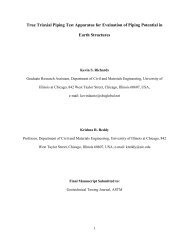Toward a Useful Theory of Mentoring: A Conceptual Analysis and ...
Toward a Useful Theory of Mentoring: A Conceptual Analysis and ...
Toward a Useful Theory of Mentoring: A Conceptual Analysis and ...
You also want an ePaper? Increase the reach of your titles
YUMPU automatically turns print PDFs into web optimized ePapers that Google loves.
a mentor” (Eby, Butts, Lockwood, & Simon, 2004; Ragins, Cotton, & Miller, 2000;<br />
Tepper, 1995) or “How many mentors have helped you?” (Chao et al, 1992; 624). While<br />
providing a definition <strong>and</strong> then asking, for example, “do you have a mentor?” is in most<br />
instances acceptable, this approach also increases the likelihood <strong>of</strong> “framing” <strong>and</strong> other<br />
response artifacts. Some studies ask a series <strong>of</strong> questions about the characteristics<br />
(Smith, Howard, & Harrington, 2005) <strong>and</strong> functions <strong>of</strong> a mentor (Dreher & Ash, 1990;<br />
Sc<strong>and</strong>ura & Schriesheim, 1994) making determinations on the basis <strong>of</strong> those responses.<br />
This seems in most instances more useful that asking the respondent to make a global<br />
decision about a multi-faceted concept. Still, there is no research that investigates<br />
relationships where one member <strong>of</strong> the dyad responds as a mentor or protégé while the<br />
other does not.<br />
-------------------------<br />
Insert Table 2 about here<br />
-------------------------<br />
If mentoring is viewed as a phenomena not requiring awareness or<br />
acknowledgement by the persons involved, very different research techniques might be<br />
required, such as participant observation or unobtrusive measures. For example, Burke<br />
<strong>and</strong> McKeen do not ask respondents about mentoring but ask them “to think <strong>of</strong> a senior<br />
individual who has/had served these functions [coach, tutor, counselor <strong>and</strong> confidante]<br />
for them” (1997: 46) <strong>and</strong> then discusses the findings as mentoring relationships. Do<br />
responses to questions <strong>of</strong> having a mentor differ from responses about identifying an<br />
influential person in one’s life?<br />
Question: Who is the mentor? In the beginning <strong>of</strong> the vignette David is<br />
imparting knowledge to George. But as the relationship advances, George begins to<br />
12



